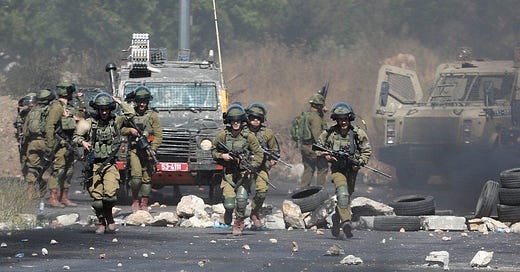Palestinians quest for territorial sovereignty has always been a generational battle, and it will continue until they have a home, they can call their own.
The Israel-Palestinian conflict has been a longstanding flashpoint in Middle Eastern politics, and tensions have caused enormous suffering on both sides.
However, the decades of oppression and subjugation reached a tipping point on October 7, when a Hamas lead attack, caught Israel off guard.
It’s surprising how a country so heavily fortified with such sophisticated technology and intelligence was attacked.
Hamas, like most organisations have their origins borne out of the Israeli government’s necessity as an end to a means.
Hamas’s formation came about because Israel wanted to counter Yasser Arafat and the PLO - Israel’s creation is now its sworn enemy.
The plight of the Palestinians has been a wound the world has consistently turned a blind eye too, but it can’t anymore.
Rather than treat it and administer the necessary care, they’ve let necrosis set in.
Ignoring one reality has now led to a dire scenario with the world on the precipice of a third World War. How did we get to this point?
Palestinian territories have been the scene of many conflicts, the establishment of the State of Israel in 1948, on former Palestine, led to immediate hostilities.
Since then, the Middle East has been soaked in the blood of Palestinians and Jews, through multiple wars and uprisings.
The peace process has been mired in difficulty, with the right of return for Palestinian refugees and the status of Jerusalem key central issues.
Another significant issue has been the international community's frequent disregard of the hardships Palestinians have faced.
Living in dire conditions in Gaza and the West Bank, Palestinians have withstood economic hardships, military occupation, and blocked humanitarian aid.
And the lack of consistent diplomatic international intervention and humanitarian support has deepened their resentment and desperation.
Hamas argues because of decades of subjugation, it launched rocket attacks against Israel, primarily in defence of the Palestinian people.
And while the strikes have been frequent, the October 7 assault was unparalleled in its scale and intensity.
Hamas’s attack, it says, wasn’t just a culmination of desperation and the international community's repeated failures, but a call for attention to the world, emphasising the urgency of the Palestinian situation.
October 7 has had far-reaching implications. Israel's immediate response was robust, leading to a significant escalation in the conflict.
Many countries, already involved in regional disputes, have taken sides, leading to heightened tensions globally.
Given the strategic importance of the Middle East, any large-scale conflict threatens to disrupt global energy supplies, leading to a potential worldwide crisis.
The US, Russia, China, and the EU, have vested interests in the region.
Their involvement or even posturing in the aftermath of the attack could lead to a larger global conflict. The US, Iran and Hezbollah are poised with Hezbollah’s leader, Sayyed Hassan Nasrallah, warning the US if Israel did not stop its assault on Gaza, fighting on the Lebanese front could turn into a wider war.
A strong military force backed by Iran, Hezbollah has been engaging Israeli forces along the Lebanon-Israel border in the deadliest escalation since it fought a war with Israel in 2006.
Nasrallah in a televised speech speaking for the first time since the Israel-Hamas war erupted said “Hezbollah was ready for all possibilities.”
Nasrallah blamed the US for the war in Gaza and the high civilian death toll and said a de-escalation in the besieged enclave was vital to prevent regional war.
“You, the Americans, can stop the aggression against Gaza because it is your aggression. Whoever wants to prevent a regional war, and I am talking to the Americans, must quickly halt the aggression on Gaza,” Nasrallah said.
Nasrallah said that further escalation along the Lebanese border between Israel and his group, was contingent on what happened in Gaza.
Palestinians have suffered too long at the hands of the Israeli Government and now their plight is more desperate than ever before, and the world is witnessing live the brutal act of genocide being committed.
The international community has a history of waiting too long to act, often intervening only when situations become critical and the current Palestinian crisis underscores the need for proactive diplomacy, and sustained engagement in resolving the Israel-Palestine issue.
Despite these challenges, within Israel’s borders, a vigorous debate on the future of the land and peace with Palestinians continues, with many advocating for a two-state solution and supporting Palestinian rights.
The Israeli narrative is entwined with a profound historical yearning for security and peace - born from the ashes of the Holocaust and centuries of exile.
Peace remains elusive with threads of hope and stained by the bloodshed of decades of conflict that has spared neither Israeli nor Palestinian the anguish of loss.
But sidelining the Palestinian plight has allowed for the festering of resentment, which has exploded with unforeseen consequences.





Hi Jamie - great to hear snd thank you for supporting and enjoying my work. I’m sure through your research and readings that you have come to discover the Palestinians have been subjugated for decades and the very government who has been subjugating them (not the people - every day jew) are equal to if no different to the Nazi Germany regime. This is a complex issue that the global community has no desire to find a solution too. Zionistc politics controls the world.